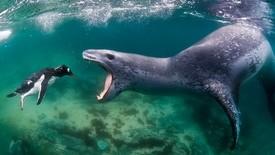so, zero carb folks...
Options
Replies
-
Kitnthecat wrote: »I believe that to be true. We see our aboriginal cultures where I live, to be facing devastating health consequences such as obesity and diabetes, as a result of adopting a sugary, high carb, highly processed SAD diet. I'm sure that their modern diet is much different than the diet they would have eaten centuries or even decades ago, when they would have eaten off the land......wild meat including fat, fish, berries, etc.... I suspect that if they returned to that way of eating, their health would improve.
They would, and they do. Someone in Australia actually tried that on the Aboriginals. They took something like a dozen moderized natives, all of whom were suffering from excess weight, Diabetes (or insulin resistance), and poor lipid markers. Something like 6 months back to their traditional way of life, and all their ailments were reversed.We have a restaurant here that serves wild game, actually more than one, but the one I'm thinking of is more trendy mainstream. People are really starting to expand to different sources of meat.
Something that made a connection for me the other day was reading an article about ancient cultures that are meat/fat, one if them being the native buffalo eating cultures. I live in the suburbs of buffalo ny, named for the high population of buffalo in the area. It makes me think that different parts of the world are populated by different species of animal and plant. Could it be that because we live in those areas we need the indigenous sources fur optimal health, which could be different for everyone given their geographic location.
The prevalence off auto immune disorders, weight issues, diabetes are extremely high in my area, much attributed to the winter weather causing a more sedentary lifestyle.
Could it explain why studies of some groups show one WOE is beneficial for some but unhealthy for others?
*sorry if my posts kinda ramble, I get thinking and my mind just goes
If you go the route that the specific type of animal matters, then I think it'd be more about what was available to our ancestors.
I think it's more broad than that, though, if it were to hold true. Whitetail, Caribou, and Elk are all types of deer, so while my ancestors lived off a fair amount of caribou (lots of Scandinavian), but I thrive off Whitetail and have never had Caribou.
I think what matters most, though, is consuming foods raised as nature intended. That is, not soaked down with pesticides and not packed into corrals like sardines, but raised on biologically appropriate diets and grown in ways where pesticides aren't really needed.0 -
I don't think the specific type of animal matters much at all. I prefer some types of meat, but I doubt that there's any biological need to find one closest to what our ancestors ate.0
-
I don't know about the different types of animals, but think that certain cultures may have adapted better to certain food groups, such as dairy for instance, while other groups may be better adapted to other foods (assuming of course that we have not strayed from our ancestral roots...getting harder to imagine in today's world.) But without a doubt, "consuming foods raised as nature intended" is key for all. Humans are not meant to consume chemicals like pesticides, or man-made stuff like hydrogenated fats, or processed sugar, etc. Not only are they not needed, they are harmful to our health.0
-
@dragonwolf @FIT_Goat the buffalo was just an example based on the previous abundance in this area. But something that wouldn't have been as abundant would be crops based on the limited growing season. Whereas warmer climates would have had more access to abundant fruits and vegetables, and other areas would have corn and wheat in abundance. That would be a very limited view on it, I'd likely need to research back hundreds and thousands of years to see a connection. But it's curious to me how some people don't have issue with grains and others do, while others can't handle proteins, etc...0
-
12k-110k years ago was a time of extensive glaciation. It's likely that fruits and vegetables were anything but abundant for most of our ancestors. Actually, most of the time our ancestors were evolving has been during the most recent ice age (which extends back about 2 million years until today, with various glaciation events).0
-
Collagen isotope analysis:
http://www.nature.com/ejcn/journal/v56/n12/full/1601646a.html
In all three studies the Neanderthal values were compared with contemporary species of known diets and in all cases the Neanderthals, based on the values, were most similar to top-level carnivores. This means that, for these five individuals from three different areas of Europe and ranging in age from approximately 100 000 to 28 000 years old, there is a remarkably similar adaptation. These five Neanderthals were all top-level carnivores who derived the vast majority of their protein from animal sources, likely to be large herbivores.
0 -
@FIT_Goat @wabmester Thank you for your input. I know we'll never know all the answers but I love opening my eyes to new ideas0




